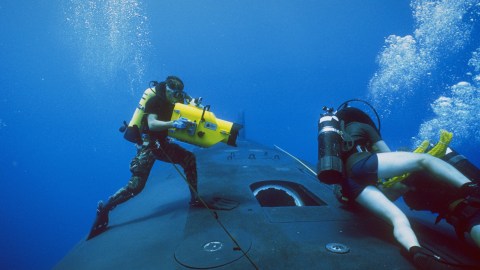How the keto diet could give Navy SEALs a tactical advantage

Getty / Historical / Contributor
- The U.S. military has been funding research exploring how the keto diet might benefit soldiers during deep-diving missions.
- The technology that Navy SEALs use to stay hidden underwater can lead to seizures. Studies suggest ketosis might prevent these seizures.
- Still, ethical and legal questions remain, and researchers hope to continue learning more about how ketosis might yield advantages on the battlefield.
The keto diet could soon give Navy SEALs a tactical advantage in battle: The ability to spend more time underwater.
The keto diet — high in fat, moderate in protein, low in carbs — puts the body in a natural metabolic state called ketosis. In ketosis, brain cells burn ketones instead of glucose for fuel. Studies suggest that this state prevents people from having a seizure, which is a major risk for special-operations divers who use closed-circuit rebreathers on their oxygen supplies. These devices minimize the amount of bubbles that appear on the water’s surface — crucial for stealth missions — but also increase the risk of seizure, convulsions and nausea, all of which can be deadly during a mission.
“One of the effects of truly being in ketosis is that it changes the way your body handles oxygen deprivation, so you can actually stay underwater at [deeper] depths for longer periods of time and not go into oxygen seizures,” Lisa Sanders, director of science and technology at U.S. Special Operations Command, said at a high-level defense industry conference in Tampa in May, as the Washington Times reported.
For years, the U.S. military has funded research exploring how ketosis might benefit divers. The leading example is a 2015 study led by Dominic D’Agostino, a neuroscientist at the University of South Florida. D’Agostino and his team gave ketone supplements to rats and placed them in hyperbaric chambers that simulated deep-diving conditions. The results showed that, compared to a control group, rats on ketone supplements had fewer seizures. Also, these rats performed better on physical and cognitive tests.
Ethical questions
But just because there’s a clear link between ketosis and fewer seizures doesn’t mean it’s ethical or legal to command soldiers to stick to a particular diet — especially one as controversial (and potentially dangerous, if implemented incorrectly) as keto.
“… I don’t have the authority to tell people — swimmers, submariners, etc. — that they’re going to get themselves in ketosis so they can stay in the water longer,” Sanders said at the defense industry event. “That’s an authority question, not a technology question.”
What’s more, it’s possible that radically changing soldiers’ diets could have unpredictable consequences.
“For me, it smacks of the removal of free will from one of the most basic of biological functions: eating and consuming energy. It’s also one that misunderstands and misrepresents how a biological organism works,” E. Paul Zehr, a neuroscientist and biomedical research scholar at Canada’s University of Victoria, told Business Insider. “Biological beings are not automatons or machines. You can’t just attempt to optimize one thing and not have it alter something else. All systems … exist in a balance.”
Ultimately, soldiers may simply decide for themselves whether the diet is right. Future research will hopefully help them make informed decisions.
“We are motivated to perform larger and more comprehensive studies aimed at elucidating therapeutic and health/performance benefits of ketosis for military members,” Jeff Volek, a professor in the Department of Human Sciences at the Ohio State University who’s conducted research on military personnel and keto, told Business Insider. “We have submitted several grants over the years and continue to do so to move this from hypothesis to the lab to the battlefield.”





